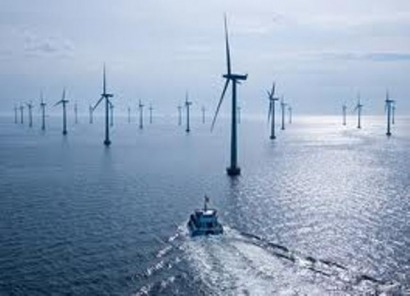
As part of the initiative, the US Dept. of Interior said it will expedite environmental reviews for four wind projects off the coasts of Virginia, Maryland, Delaware and New Jersey.
In addition it said that later this year it will identify other potential sites wind energy development off Massachusetts, Rhode Island and the South Atlantic region, notably North Carolina.
“This initiative will spur the type of innovation that will help us create new jobs, build a clean energy future and compete and win in the technologies of the 21st century,” said Interior Secretary Ken Salazar at a press conference on Monday.
Officially called “A National Offshore Wind Strategy: Creating an Offshore Wind Industry in the United States,” the plan is part of Obama’s goal of generating 80 percent of the nation’s energy from renewable energy sources by 2035. It is also expected to cheer wind power advocates who have been calling for a streamlined process.
Currently, the only offshore wind farm to receive a lease in the US is the Cape Wind project planned off the coast of Massachusetts. The project was approved last year after an eight-year wait, largely attributed to opposition from environmentalists, Indian tribes, tourists and the late US Sen. Ted Kennedy, who argued the project would threaten marine life and harm the state’s summer tourism industry.
Salazar said the wind farms identified Monday -- all of them off major tourist destinations, including Atlantic City, NJ, Ocean City, Md.; and Virginia Beach, Va. -- would be 10 to 20 miles offshore so they shouldn't mar vacationers' views.
The Department of Energy said it would spent up to $25 million over five years to support the development of innovative wind turbines, up to $18 million over three years to study how to optimise the wind market and up to $7.5 million over three years to fund more cost-effective turbine drive trains.
“Offshore wind power holds incredible potential to drive our energy and economic engine forward while reducing pollution,” Sean Garren, clean energy advocate for Environment America, said in a statement. "Nations around the world have already proven the effectiveness of this resource. If we do not move quickly, we risk falling behind."
For additional information:

